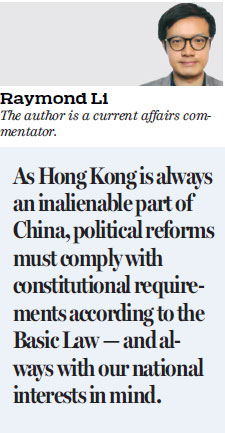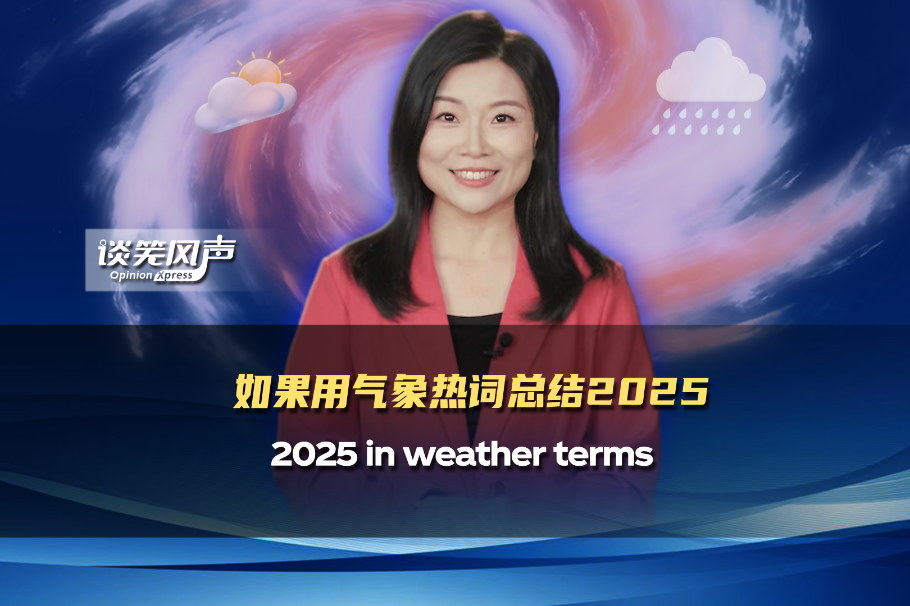Democracy requires a sound legal basis

Raymond Li warns against tyranny of majority, and opposition falsely equating universal voting rights with equality
Britain's wartime prime minister Sir Winston Churchill championed the ideals of democracy as "democracy is the worst form of government, except for all the others"; equating democracy with effective governance, but little is known of how such "causation" is translated, bringing questions on the role and relevance of democracy in Hong Kong. One common, yet misconceived, perception propounded by the "pan-democratic" opposition is conflating democracy with "equality" as exemplified by their demand for a model of "universal suffrage", totally disregarding our political reality.
In Hong Kong, the legal basis of the selection of the chief executive by universal suffrage has been laid down under the Basic Law and the National People's Congress Standing Committee decision on Aug 31, 2014. Article 45(2) of the Basic Law provides that CE selection by universal suffrage is "upon nomination by a broadly representative nominating committee in accordance with democratic procedures". The Aug 31 decision further clarifies that each of the two to three candidates must have the endorsement of more than half of all Nominating Committee members before being returned to votes by all eligible electors, with the one carrying the largest number of votes becoming the CE, upon being appointed by the Central People's Government. The government's electoral reform proposal conforming to these constitutional requirements on CE selection by universal suffrage was unfortunately voted down in 2015. But no one should have any illusions - any reform proposals circumventing, or infringing, these constitutional requirements are totally out of the question.

In fact, democracy is never a concept postulated in situ on "equality" as the classical definition raised and questioned by political scientist Joseph Schumpeter, which provides as "the institutional arrangement for arriving at political decisions which realize the common good by making the people decide issues through the election of individuals who are to assemble in order to carry out its will". As the public opinion in all societies amounts to "an indeterminate bundle of vague impulses loosely playing about given slogans and mistaken impressions", it is vital that our local politics warrants leadership of "specialists" such as the CE in making political decisions on behalf of the public. It is through the repertoire of leadership traits possessed by our duly elected CE that the "will of the people" can be effectively determined for judging "the common good" for our society and country as a whole.
In rebutting opposition's criticism that the constitutional method of selecting the CE by universal suffrage is "undemocratic" with the existence and power of the Nominating Committee, first one may refer to the underlying principle, namely the "necessity test" of the International Covenant on Civil and Political Rights which is applied to Hong Kong through local legislation by virtue of Article 39 of the Basic Law. The Hong Kong government may make any restrictions on covenant rights, including the right to participate in public life through elections, as long as it has demonstrated the necessity and takes measures proportionate to the pursuance of its legitimate aims. It is then understood that the composition and power exercised by the Nominating Committee in compliance with our constitutional requirements hardly constitute any "unreasonable restriction" on the covenant as contrarily contended by the opposition.
Nevertheless, by tarring democracy with a broad brush of "equality" in the absolute sense without any reasonable restriction, the opposition risks placing democracy in a state of anarchy unseen in any countries worldwide. Also, it may give rise to Alexis de Tocqueville's "tyranny of majority" - the majority that governs in the name of the people, bringing to the fore conditions under which the rule of the people degenerates into the tyranny of the majority. Most Hong Kong residents are peaceful citizens sincerely desiring the good of Hong Kong and the Chinese mainland but we shall be vigilant when the majority becomes omnipotent to the extent that checks and balances against it vanish and the democracy may become a tool of demagogues manipulating the public for their private gain. In Hong Kong, regarding reports of opposition politicians receiving funds from individuals and bodies with external forces, it is not an exaggeration that a rosy dream of democracy presented by opposition politicians could, in reality, be a nightmare.
Taking the gloomy lessons on democracy from Britain in light of the Brexit decision, ridiculed as a "victory" of irrationality and populism over democracy, we must realize that the model of Western liberal democracy is no longer the ultimate political system, "the end of history and the last man" as erroneously predicted by Francis Fukuyama two decades ago. Any political maneuver in the name of "democracy", but with a hidden anti-China agenda carried on by the lackeys of external forces in Hong Kong, is doomed to fail. It must therefore be strongly condemned.
Democracy, to a certain degree, is certainly conducive and necessary to any society, including Hong Kong, which facilitates more inclusive governance. It must be accountable to the people whose wishes are heard and reflected in the formulation of public policies by the government. Nevertheless, Aristotle said the essence of democracy does not lie only in expanding political rights. It is the freedom which, along with the rule of law, safeguards us against any abuse of power and against tyranny. As Hong Kong is always an inalienable part of China, political reforms must comply with constitutional requirements according to the Basic Law - and always with our national interests in mind.
(HK Edition 11/09/2017 page7)
Today's Top News
- China holds central rural work conference
- President Xi to deliver New Year's message to ring in 2026
- Xi's diplomacy in 2025: Shedding light on a world at crossroads
- FTP has given Sanya a complete makeover
- China to apply lower import tariff rates to unleash market potential
- China proves to be active and reliable mediator






























